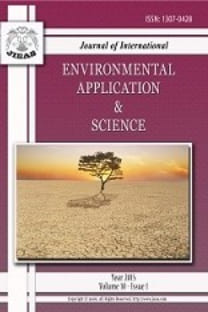Organochlorine Pesticides and PCB in Meat and by-Products from Albanian Markets
Organochlorine pesticides, PCBs Meat samples, Gas chromatography,
___
- Ahlborg UG, Brouwer A, Fingerhut MA, (1992) Impact of polychlorinated dibenzo-p-dioxins, dibenzofurans, and biphenyls on human and environmental health, with special emphasis on application of the toxic equivalency factor concept. Eur J Pharmacol 228(4):179-199.
- ATSDR, (2000)Toxicological profile for polychlorinated biphenyls (PCBs).US department of health and human services, Public health service, Agency for toxic substances and disease registry, Atlanta, Georgia.
- Bernard A, Hermans C, Broeckaert F, Depoorter G, De Cock A, Houins G, (1999) Food contamination by PCBs and dioxins. Nature 401, 231–232.
- Codex Alimentarius, Volume II-Pesticide Residues in Food. 2010 Di Muçio, (1996) Organoclorine, Pyrethrin and Pyrethroid Insecticides: Single Class, Multiresidue Analysis of. Pesticides. Pesticides. 6384-6411
- Erickson, M.D. (2001). Introduction: PCB properties, uses, occurrence, and regulatory history. In: Robertson, L.W., Hansen, L.G. (Eds.), PCBs: Recent Advances in Environmental Toxicology and Health Effects. The University Press of Kentucky, Lexington, Kentucky, pp. 131–152.
- EN 1528-1. (2000); Part 1: Fatty Food-Determination of Pesticides and polychlorinated biphenyls [PCBs]
- EN 1528-2. (2000); Part 2: Extraction of fat, Pesticides and polychlorinated biphenyls [PCBs and -Determination of Fat Content EN 1528-3. (2000); Part 3: Clean-up methods
- EN 1528-4. (2000); Part 4: Determination, Confirmatory tests, miscellaneous
- European Commission, Joint Research Centre, Institute for Health and Consumer Protection, Food Products Unit, I-21020 Ispra (VA), Italy
- Lazaro R, Herrera A, Arino A, Pilar Conchello M, Bayrri S, (1996) Organochlorine pesticide residues in total diet samples from Aragon (Northeastern Spain). J.Agric.Food Chem. 44, 2742-2747.
- Nuro A, Koci K, Marku E, (2007) Occurrence of Persistent Chlorinated Contaminants using Butter as an Integrative Matrix., Journal of Environmental Protection and Ecology 8,No 3, 544-555.
- Papadopoulos A., Vassiliadou I., Costopoulou D., Papanicolaou C., Leondiadis L. (2004) Levels of dioxins and dioxin-like PCBs in food samples on the Greek market. Chemosphere 57, 413–419
- Santillo D., Stringer R.L., and Johnston, P.A. (2004) The global distribution of PCBs, organochlorine pesticides, PCDDs and PCDFs using butter as an integrative matrix. Chemosphere. 40 1033-1040
- Focant J-F, Pirard C, De Pauw E, (2004) Levels of PCDDs, PCDFs and PCBs in Belgian and international fast food samples. Chemosphere 54 137–142
- ISSN: 1307-0428
- Yayın Aralığı: Yılda 4 Sayı
- Başlangıç: 2006
- Yayıncı: Selçuk Üniversitesi
Sadija KADRİU, Mehush ALİU, Milaim SADİKU, Mensur KELMENDİ, İsmet MULLİQİ, Nushe LAJÇİ
Stoichiometric Model of Combustion Process of Lignite in "PP Kosova B"
İsmet MULLİQİ, Milaim SADİKU, Luljeta PULA, Fisnik OSMANİ, Mehush ALİU
Ayat Munaf HAMEED, Ahmed J. M. AL-AZAWİ
Jahir GASHİ, Vasil JORGJİ, İzet ZEQİRİ, Sami DURAKU, Ramiz KRASNİQİ
Organochlorine Pesticides and PCB in Meat and by-Products from Albanian Markets
The determination of Drilling Machine Productivity in Trepca Mine Stantërg
Jahir GASHİ, Vasil JORGJİ, İzet ZEQİRİ, Sami DURAKU, Ramiz KRASNİQİ
İsmet MULLİQİ, Avni TERZİQİ, Mensur KELMENDİ, Blerim BARUTİ, Sadije KADRİU
Features of Environmental Issues Related to Abandoned Mining Exploitations in Albania
Mehush ALİU, Luljeta PULA-BEQİRİ, Sadija KADRİU, Milaim SADİKU, Nushe LAJÇİ, Mensur KELMENDİ
